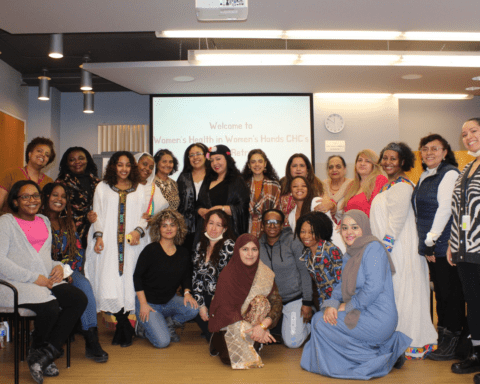There is an ever present bias in the historical theories of racialized people being more susceptible to disease, and these theories have been perpetuated by modern day media, say some Canadian researchers.
Goldameir Oneka, University of Toronto PhD candidate and author of Extra, Extra, read all about it!: Toronto print news media coverage of type 2 diabetes, says the idea of race being linked to disease has long standing historical roots in biomedical research and practice.
“If you look at the bio-medical literature – historical bio-medical literature – racialized peoples’ were constantly presented as individuals who were inherently diseased,” explains Oneka (full disclosure: she is the sister of this article’s author).
“So we see theories that mainly linked the presence of diseases in racialized peoples to their so-called race. If they were sick it was because there was something in their DNA that made them sick. While there are some diseases that are linked to race/ethnicity there are many more that are not, and here is where the problem lies.”
It is this school of thought that has fuelled the idea that non-White people are more susceptible to disease than White people.
“There was very little connection to economic circumstances or changes that happen when people immigrate to a new country.”
Dr. Margery Fee, professor of English at University of British Columbia and author of the “Racializing Narratives: Obesity, Diabetes and the ‘Aboriginal’ Thrifty Genotype” in the journal Social Science and Medicine, indicates that until recently it was generally accepted that race was useful in predicting disease – without examining intersection of ethnicity, race and socio-economic status.
“There was very little connection to economic circumstances or changes that happen when people immigrate to a new country,” Fee says. “There was very little understanding of those social factors which is hardly surprising because scientists are educated in a very narrow way – with very little in the way of humanities education.”
Rooted in idea of racial hierarchy
The racialization of disease can be traced back to Darwin and social Darwinism, Fee explains, a theory that stated there was a kind of racial hierarchy with the White race being at the top, and the so-called ‘fittest’.
As Oneka points out there are several examples of where this theory has come into play when looking at diseases within particular communities.
“Racialized peoples once again are presented as being ignorant for having the disease.”
“If you look in South Africa for example, they had this thing that Blacks who had TB (Tuberculosis) had it because their bodies were not used to civilization,” Oneka recalls. “When they got civilized, their body couldn’t handle it so that’s how they got TB. They needed to go back to the primitive ways of living and doing things.”
Or, Oneka adds, “In the North American context, there is a lot of talk about the Aboriginal population, Aboriginal peoples have a higher rate of type 2 diabetes because they have a gene – the thrifty gene theory.”
The role of the media
In order to counter such ways of thinking, the existence of such schools of thought must first be acknowledged.
Oneka looked at how what was going on with type 2 diabetes was covered by Toronto print newspapers by conducting a content analysis. She examined things like the language used.
“Racialized peoples once again are presented as being ignorant for having the disease,” Oneka says of her findings. “They don’t know how to take care of themselves type of thing, and they are inherently diseased too,” she explains, adding articles would at times imply “their genes make them more predisposed to developing this disease compared to the White population.”
“Yes, it’s true that everybody but White people has a higher risk factor for obesity and diabetes. But, it’s connected to poverty.”
There is often a part of the story missing in news reports, Fee explains, pointing out that while the research she looked at years ago did show that White people seemed to have a better track record when it came to diabetes, this couldn’t necessarily be attributed to their race.
“… [They] were demographically better off. As a result, they had a better diet, got more exercise and lived in better neighbourhoods,” Fee explains, adding they, for example, might be able to walk to the grocery store instead of having to drive.
“Yes, it’s true that everybody but White people has a higher risk factor for obesity and diabetes,” Fee says. “But, it’s connected to poverty. And it is that fact which doesn’t turn up in the warnings.”
Reporting should ‘reflect reality’
Oneka recommends that the media give more thought to how it reports on health. This is particularly important since generally people learn more about disease from the media than their doctor.
When it comes to diabetes Oneka’s research shows that the media represents it mostly as a lifestyle or individual or genetic issue.
Oneka insists the media should reach out to social scientists that can shed insight on how environmental factors … play into the development of disease.
“These kinds of reporting attributes blame, and makes the individual think it’s their fault that they are sick,” she explains. “If a person does not have a good job, they can’t afford to eat well, and the media needs to cover a more accurate account of the causes of diseases – reflect reality.”
Part of the problem, Oneka adds, is that reporters are not specialists, and therefore rely on interviews with scientists who mainly have bio-medical backgrounds for their news coverage.
Oneka insists the media should reach out to social scientists that can shed insight on how environmental factors such as the economics, poverty, racism, prejudice and ageism play into the development of disease.
Fee agrees. “People don’t like to talk about economic disparity,” she says. “Public health is not very popular. People want to find cures for cancer in any way, but [not fix] the environment [which is] a huge systematic and ideological barrier. It’s much more fun to go after a kind of gene or a drug where you can kind of narrow the problem.”




